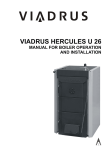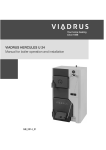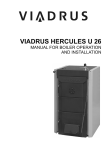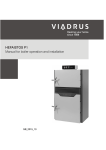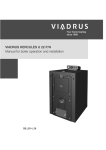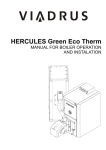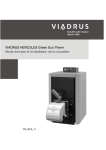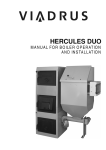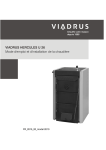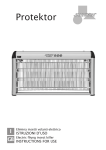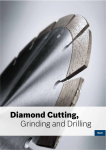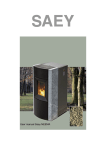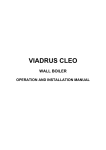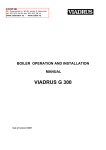Download Viadrus Hercules P 1 Technical data
Transcript
VIADRUS HERCULES ECO Manual for boiler operation and installation GB_2015_11 SD Table of contents: 1. page Produced boiler variants ..............................................................................................................................3 1.1 Purchase order .....................................................................................................................................3 2. Boiler usage and advantages ......................................................................................................................3 3. Boiler technical data ....................................................................................................................................5 4. Boiler description .........................................................................................................................................7 4.1 Boiler drum construction.......................................................................................................................7 4.2 Construction of combustion chamber and fuel transport lines .............................................................8 4.3 Control, regulation and safety elements ...............................................................................................8 4.4 Boiler outfit and accessories ..............................................................................................................11 5. Positioning and installation ........................................................................................................................13 5.1 Rules and regulations .........................................................................................................................13 5.2 Positioning possibilities.......................................................................................................................14 5.3 Boiler hydraulic diagram .....................................................................................................................16 6. Boilers assembly .......................................................................................................................................17 6.1 Boiler drum installation .......................................................................................................................17 6.2 Burner assembly ................................................................................................................................18 6.3 Assembly of combustion chamber .....................................................................................................19 6.4 Assembly of the fuel transport lines ...................................................................................................24 6.5 Boiler shells and regulator assembly..................................................................................................25 6.6 Fuel reservoir assembly (this part is delivered optionally): .................................................................26 6.7 Filling the heating system with water ..................................................................................................27 7. Commissioning- instructions for contracting service organization.............................................................28 7.1 Verification before commissioning. ....................................................................................................28 7.2 Boilers commissioning .......................................................................................................................28 8. Boiler operation by user .............................................................................................................................29 8.1 MONEX regulator ...............................................................................................................................29 8.2 Boiler output setting ............................................................................................................................33 8.3 Boiler firing .........................................................................................................................................35 8.4 Boiler operation ..................................................................................................................................35 8.5 Boiler shut-down .................................................................................................................................35 9. IMPORTANT NOTES ................................................................................................................................36 10. Maintenance by user ..............................................................................................................................36 11. Product liquidation instructions after service life ....................................................................................37 12. Guarantee and liability for defects .........................................................................................................37 2 Dear customer, we thank you that you have bought the VIADRUS HERCULES ECO automatic boiler thus having shown your confidence in VIADRUS a.s. For you to get used to a correct way of handling your new product from the beginning please read at first this manual for its usage (first of all the chapter no. 8 – Boiler operation by user, chapter no. 9 – Important notes and chapter no. 10 – Maintenance by user). Please follow the undermentioned information in order to guarantee a long-time and trouble-free boiler operation to both your and our satisfaction. 1. Produced boiler variants 1.1 Purchase order In the purchase order there must be specified: Purchase order specification code VIADRUS HERCULES ECO X Size: 5: 5 sectional design 10: 10 sectional design 1. Boiler design (defined by the fuel reservoir position against the boiler drum in the front view): left version right version 2. Optional accessories (see chapter 4.4.) !ATTENTION! The fuel reservoir isn’t included in standard boiler accessories! The version of the boiler you received is only intended for combustion of wooden pellets (see the specification chp. no. 3) and its trade name is VIADRUS HERCULES ECO. The boiler is manufactured as in warm-water design with forced heating water circulation and operating overpressure up to 400 kPa (4 bar). Before dispatch it is checked for tightness by applying 800 kPa (8 bar) test overpressure. 2. Boiler usage and advantages Usage: • • VIADRUS HERCULES ECO 5 boiler is preferentially intended for heating the individual housing units, cottages, weekend houses, office buildings, small premises, smaller leisure amenities, etc. VIADRUS HERCULES ECO 10 boiler is preferentially intended for heating the medium size buildingsshops, schools, leisure amenities, medium size premises, big cottages etc. Boiler advantages: • • • • • • • • • automatic operation controlled by an indoor device that guarantees a comfortable heating; mechanical fuel supply from any reservoir; simple, not time-consuming operation and maintenance; high efficiency achieving up to 87 %; low emissions complying with the values defined by „Environmentally friendly product”; depending on boiler room disposition there can be chosen either the left-or right-hand side boiler version (given by the fuel reservoir position); boiler drum verified on a long-term basis; high service life of the cast-iron boiler drum; boiler drum guarantee 5 years. 3 Fig.no.1 VIADRUS HERCULES ECO with fuel reservoir front view– left version Fig.no.2 VIADRUS HERCULES ECO with fuel reservoir rear view– left version 4 3. Boiler technical data Tab. no.1 Dimensions, boiler thermal& technical parameters Number of section Nominal output Adjustable output Fuel consumption -1 (heating power approx. 17 MJ.kg ) Output in „inhibition“ regime Fuel Consumption in „inhibition“ regime Efficiency Boiler category according to EN 303-5 Weight Water space volume Diameter of smoke socket Delivered fuel reservoir capacity Burning time at the nominal output Burning time at the minimum output Boiler dimensions: width x height x depth Maximum water operating overpressure Testing water overpressure Heating water minimum temperature Heating water maximum temperature Minimum return water temperature Chimney draught Flue gases temperature Flue gases mass flow rate at the output: - at the nominal output - at the minimum output Boiler connections - heating water - return water Noise level Connecting voltage Electric input Regulator electric coverage kW kW kg. h VIADRUS HERCULES ECO 5 5 24 7 – 24 VIADRUS HERCULES ECO 10 10 42 13 – 42 1,8 – 5,9 3,9 – 10,8 -1 kW -1 kg. h % 1,5 0,37 86,5 4 441 40,9 kg l mm 3 dm kg h h mm kPa (bar) kPa (bar) °C °C °C mbar °C 87,3 4 645 64,4 156 725 470 80 261 1893 x 1407 x 1217,5 43,5 120,5 1893 x 1407 x 1697,5 400 (4) 800 (8) 60 90 40 -1 kg. s -1 kg. s Js Js dB 0,15 – 0,25 110 – 170 0,20 – 0,30 110 – 142 0,019 0,013 0,038 0,029 G 1 1/2“ G 1 1/2“ Doesn´t exceed level 60 dB (A) 1/N/PE 230 V AC 50 Hz TN - S 90 IP 65 W * When keeping the minimum temperature of heating water pz [Pa] BOILER HYDRAULIC LOSS 5000 4500 4000 3500 3000 2500 2000 1500 1000 500 0 HERCULES ECO 10 HERCULES ECO 5 0 0,5 1 1,5 2 5 2,5 3 3,5 4 4,5 3. -1 Q [dm s ] Specified fuel: The pellets must comply at least with one of the standards or regulations as follows: Regulation no.14-2000 MŽP ČR DIN 517 31 ÖNORM M 7135 Prescribed pellets granularity: between 6 and 10 mm Maximum fuel water content. 12%. Ash content max. 1,5 % WARNING! A poor quality of fuel can markedly negatively affect the boiler output and emission parameters Fig.no. 3 Boiler dimension (dimensions behind the slash apply to VIADRUS HERCULES ECO 10) 6 4. Boiler description 4.1 Boiler drum construction The main boiler component is the cast iron sectional boiler drum made of grey cast iron according to EN 1561. • Central sections – quality 150 (previously ČSN 42 2415) • Front and rear sections – quality 200 (previously ČSN 42 2420) The boiler pressure components comply with strength requirements according to EN 303-5. The boiler drum consists of cast iron sections by means of forced on boiler insertions and is secured with anchor bolts. The sections create a combustion chamber and the ash pan space, the water space and the convection section. The ash pan space is divided from the combustion chamber through a solid water-cooled grate. Between the combustion chamber and the convection part of heat exchanger there are installed the ceramic plates that regulate combustion and influence positively the emission values. In the flue gases ducts of the heat exchanger convection part there are inserted the turbulators in order to reduce the flue gases temperature thus to increase the boiler efficiency. The boiler rear section has in its upper part a smoke adapter and heating water flange (G 1 1/2“), then in lower part the return water flange (G 1 1/2“) with a sleeve piece for filling and discharging cocks (G 1/2“). To the front section there are mounted the stoking and ash pan doors; the combustion chamber door is behind them. The whole boiler drum is insulated by using a health harmless mineral insulation which reduces the heat interchange losses in surroundings. The steel boiler shell is treated by applying a good quality powder paint. 1. 2. 3. 4. 5. 6. 7. Fig.no. 4 Cast iron boiler drum 7 Front section Middle section Rest section Anchor bolt Stoking door Ash pan door Smoke extension 4.2 Construction of combustion chamber and fuel transport lines The combustion chamber consists of a longitudinal concave drum made of heat-resisting steel to which there joins askew from below the piping for fuel supply with a screw conveyer for the combustion chamber. This conveyer is also connected with pellets reservoir through another height offset (mismatch) screw conveyer which is equipped with regulators functioning in dependence on discharging the combustion chamber conveyer. The combustion chamber concave drum which is interconnected with forced air supply is equipped with a system of slots in the side walls and in the bottom for the purpose of primary air supply. Thanks to a convenient combustion chamber disposition the combustion chamber functional space doesn’t get clogged with the combusted material. This after combustion is continually and mechanically expelled by the fresh fuel supply. The unburnt fuel will not become clinkered neither will it become attached to combustion chamber walls. The combustion is safe. Thanks to the regulated fuel supply and the screw conveyer height offset (mismatch) there is excluded the fuel transport lines fire penetration. The combustion chamber screw conveyer and the fuel reservoir screw conveyer are mutually interconnected through a flex hose. Combustion chamber is from above covered by a ceramic arch which directs the flames to the secondary air inlets. This results in a better combustion with a significant reduction in light ash particles. 4.3 Control, regulation and safety elements The boiler regulator serves for an automatic control of boiler activities and elements. It processes the input data from the sensors and external control elements (see chap.8.1) and according to parameters set by the manufacturer or user it controls automatically the boiler activity in required regimes. The regulator also enables to operate the boiler manually which can be advantageously used to at boiler commissioning. A high variability in setting the limit and operating parameters makes it possible for both the manufacturer and user to use fully and effectively the characteristics of automatic boilers for pellets it means an economical boiler operation, controlled combustion process thus the toxicants content in flue gases minimization. Emergency thermostat is installed in the regulator box and its function is to protect the heating system against overheating. The manufacturer set it on 95 °C, it means the temperature higher than it can be set as the required temperature at the boiler. In case that the emergency thermostat was switched off (the red control lamp on regulator is on) the unblocking process must be done manually. In case that the emergency thermostat was switched off repeatedly the boiler must be shut down and the reason for repeated boiler overheating must be found out. Programmable regulator - digital programmable indoor device (like HONEYWELL CM 27) intended for automatic heating regulation in cottages and flats. - 7-day heating time programme - 6 time sections during a day with individual temperature, setting range 5 – 30 °C with 0,5 °C step - programmable antifreeze protection for the season when the building isn’t used - information about the real and required temperature in the room ATTENTION! For boiler control there can only be used the free potential-free contact, switching voltage is 5 V DC. Thermomanometer serves for determination of heating water output temperature and its pressure in heating system and it is installed in the upper part of boiler shells. The clack valve and the reservoir for thermomanometer connection are situated in the upper part of rear boiler section. Forced-draught fan for combustion air is mounted directly in combustion chamber body. The combustion air volume is regulated by a throttling flap. The flue gases flow from the boiler to the chimney can be reduced by a smoke flap. This is controlled by a handle with a tow bar in the upper left part of boiler drum next to the stoking door. The air rose of stoking door cannot be used at boiler with automatic combustion of wooden pellets and it must be permanently closed. Cleaning cover of the smoke adapter positioned in its lower part serves for flue gases ways cleaning. 8 1. 2. 3. 4. 5. 6. 7. 8. 9. 10. The boiler body with armature Turbulators Ceramic plates Burner Fan Sealing pr. 90x60x3 Flange of heating water Flange of return water Cock for filling and emptying G 1/2“ Side panel of the shell 11. 12. 13. 14. 15. 16. 17. 18. 19. Side panel of the shell Sticker for alarm of smoke damper Rod Upper panel of the shell Thermomanometr Controller RKU Partition of combustion chamber Partition of smoke channel Gripping of partitions Fig.no. 5a) Boiler VIADRUS HERCULES ECO 5 9 1. 2. 3. 4. 5. 6. 7. 8. 9. 10. 11. The boiler body with armature Turbulators Ceramic plates Burner Fan Sealing pr. 90x60x3 Flange of heating water Flange of return water Cock for filling and emptying G 1/2“ Side panel of the shell Side panel of the shell Fig.no. 5b) 12. 13. 14. 15. 16. 17. 18. 19. 20. 21. Sticker for alarm of smoke damper Rod Upper panel of the shell Thermomanometr Controller RKU Partition of combustion chamber Partition of smoke channel Plate for ashes on the sheet metal Screw M6 x 25 Nut M6 Boiler VIADRUS HERCULES ECO 10 10 1. 2. 3. 4. 5. 6. Stoking door Insulation of stoking door upper Insulation of stoking door lower Ash pan door Insulation of ash pan door upper Insulation of ash pan door lower • Fig. No. 5c) 4.4 Stick door insulation by boiler sealant. Insulation of stoking door and ash pan door Boiler outfit and accessories A) Standard boiler outfit: the boiler drum including fittings shell side section incl. insulation shell upper section incl. insulation ash pan drawer ceramic plate central ceramic plate central with a riser ceramic plate outer ceramic plate frontal turbulator partition of smoke channel tow bar of smoke flap control mechanism burner incl. worm shaft, elbow pipe and adapter combustion chamber ceramic arch fuel feeder incl. a transport hose and strapping tapes regulator forced draught fan with a cover incl. throttling of the fan brush butt-end manual for boiler operation and installation manufacturing plate package (see point B) • fuel reservoir 725 l fuel reservoir side fuel reservoir side with an opening for screw fuel reservoir leg fuel reservoir bottom fuel reservoir bottom A fuel reservoir cover handle bolt M6 x 12 nut M6 bolt M6 x 16 11 1 pc 2 pcs 1 pc 1 pc 1 pcs / 3 pcs 0 pc / 3 pcs 1 pc / 1 pc 1 pc 4 pcs 2 pcs 1 pc 1 pc 1 pc 1 pc 1 pc 1 pc 1 pc 1 pc 1 pc 1 pc 3 pcs 1 pc 4 pcs 2 pcs 2 pcs 1 pc 1 pc 72 pcs 72 pcs 2 pcs washer 8,4 pendant chainlet 2 pcs 1 pc Notes: 1.) Number of pieces behind the slash apply to VIADRUS HERCULES ECO 10. 2.) The tow bar of smoke flap control mechanism includes: - Control mechanism lever - 2 pc washers 10,5 - 1 pc pins Ø 3 x 26 mm (for the lever mounting) B) Accessories in the package: plug blind 6/4” sealing Ø 60x48x2 mm bakelite ball for draw bar split pin 2,5 x 32 label for smoke flap signalling thermomanometer logo VIADRUS SK strip Ø 70 - 90 heating water flange G 1 1/2" return water flange G 1 1/2" sealing Ø 90x60x3 mm elbow 1/2” filling and discharging cock 1/2“ partition of combustion chamber gripping of partitions plate for ashes on the sheet metal insulation of stoking door upper insulation of stoking door lower insulation of ash pan door upper insulation of ash pan door lower adapter (reduction) brush tip of the spike dowel 8 mm clinch straight threaded 5 x 60 flexo 3C x 0,75, L = 4,5 m cable CMSM 3C x 0,75, L=1,8m cable CMSM 3C x 0,75, L=2m bushing PG 9 bushing HEYCO SB - 625-8 dummy plug 15,9 capillary spring cable holder self-adhesive binding band – 160 mm insulating girdle on the flat cup nut M10 washer 10,5 pad10,5 (large) bolt ST 4,8 x 13 bolt M6 x 12 spring washer 6,4 panel pin serrated washer 5,3 nut M 5 bolt M6 x 25 nut M6 boiler cement 1 pcs 2 pcs 1 pc 1 pc 1 pc 1 pc 1 pc 2 pcs 1 pc 1 pc 2 pcs 1 pc 1 pc 2 pc 1 pc/0 pc 0 pc/1 pc 1 pc 1 pc 1 pc 1 pc 1 pc 1 pc 1 pc 2 pcs 1 pc 1 pc 2 pcs 1 pc 6 pcs 2 pcs 2 pcs 1 pc 4 pcs 5 pcs 3 pcs 12 pcs 8 pcs 4 pcs 4 pcs 4 pcs 4 pcs 4 pcs 4 pcs 4 pcs 2 pcs 2 pcs 1 pc/2 pcs C) Optional accessories: digital indoor device (according to VIADRUS a.s. offer) • • u rear section shut The optional boiler accessories are not included in boiler basic price. 12 5. Positioning and installation 5.1 Rules and regulations The solid fuels boiler can only be installed by a firm authorized to mount these equipments. A project according to valid regulations must be prepared for installation. The heating system must be filled with water that meets the requirements ČSN 07 7401 and especially its hardness must not exceed the required parameters. Recommended values Hardness mmol/l 2+ Ca mmol/l total o Fe + Mn concentration mg/l *) Recommended value 1 0,3 (0,3)* WARNING!!! The use of anti-freeze mixture is not recommended by the manufacturer. a) to the heating system ČSN 06 0310 ČSN 06 0830 ČSN 07 7401 EN 303-5 b) to the chimney ČSN 73 4201 Heating systems in buildings – Designing and installation Heating systems in buildings – protecting device Water and steam for thermal energy equipments with working pressure up to 8 MPa. Boilers for central heating – Part 5: Solid fuel boilers for central heating with manual or automatic feed and max. 500 kW nominal thermal output: terminology, requirements, testing and marking. Chimneys and flue gas ducting– designing, implementation and connection of fuel consumers. c) regarding the fire regulations ČSN 06 1008 Fire safety of heat installations. EN 13501-1 +A1 Fire classification of construction products and building elements – Part 1: Classification using test data from reaction to fire tests d) to the system of HWS heating ČSN 06 0320 Heating systems in buildings – Hot water preparation – Designing and planning ČSN 06 0830 Heating systems in buildings – Safety devices. ČSN 75 5409 Water installations inside buildings. e) regarding the electric network CSN 33 0165 Electrical regulations. Identification of conductors by colours or numerals. Procedure provisions ČSN 33 1500 Electrical regulations; revision of electrical equipments ČSN 33 2000-1 ed. 2 Low-voltage electrical installations – Part 1: Fundamental principles, assessment of general characteristics, definitions. ČSN 33 2000-4-41 ed. 2 Low voltage electrical installations - Part 4- 41: Protection for safety Protection against electric shock ČSN 33 2000-5-51 ed. 3 Electrical installations of buildings – Part 5-51: Selection and erection of electrical equipment – Common rules ČSN 33 2130 ed. 2 Low-voltage electrical installations – Internal electric distribution lines ČSN 33 2180 Electrical regulations: Connection of electric instruments and appliances ČSN 34 0350 ed. 2 Safety requirements for flexibile cords and cables EN 60079-10-1 Explosive atmospheres — Part 10-1: Classification of areas — Explosive gas atmospheres EN 60079-14 ed.3 Explosive atmospheres - Part 14: Electrical installations design, selection and erection EN 60252-1 ed. 2 Capacitors for AC motors – Part 1: In general – Design, testing, dimensioning – Safety requirements – Instructions for installation and operation. EN 60 335-1 ed.2 Electric appliances for household and similar purposes – Safety – Part 1: General requirements EN 60 335-2-102 Electric appliances for household and similar purposes – Safety – Part 2-102: Special demands on appliances containing the electric connections and burning the gas, oil and solid fuels EN 60445 ed. 4 Basic and safety principles for man-machine interface, marking and identification – Identification of equipment terminals, conductor terminations and conductors 13 EN 61000-6-3 ed. 2 EN 61000-3-2 ed. 3 EN 61000-3-3 ed. 2 (ed. 3) 5.2 Electromagnetic compatibility (EMC) - Part 6-3: Generic standards – Emission standard for residential, commercial and and light industrial environments Electromagnetic compatibility (EMC) - Part 3-2: Limits - Limits for harmonic current emissions (equipment input current ≤16 A per phase) Electromagnetic compatibility (EMC) - Part 3-3: Limits - Limitation of voltage changes, voltage fluctuations and flicker in public low-voltage supply systems, for equipment with rated current ≤16 A per phase and not subject to conditional connection. Positioning possibilities Boiler positioning in the living space (including corridors) is prohibited! The installation of the boiler must comply with all requirements of ČSN 06 1008. Boilers positioning with regard to the fire regulations: 1. Positioning on the floor made of incombustible material (see Fig.6) − install the boiler on the fireproof base material exceeding the boiler platform by 20 mm on the sides and only in boiler drum depth. − If the boiler is positioned in a cellar we recommend to install it on an under-plate (bedding) minimum 50 mm high; the boiler must be installed horizontally. Fig. no. 6 Dimensions of a bedding under the boiler drum (dimensions behind the slash apply to VIADRUS HERCULES ECO 10) 2. Safe distance from combustible materials − when installing and operating the boiler it is necessary to keep a safety distance of 200 mm from the materials of combustibility grade A1, A2, B and C (D); − for easily combustible materials of combustibility grade E (F), which quickly burn and burn themselves even after removal of ignition source (such as paper, cardboard, asphalt and tar paper, wood and wood-fiber boards, plastics, floor coverings) the safe distance has to be doubled, i.e. to 400 mm; − safe distance should be doubled as bulb where the grade of reaction to fire has not been proved. Tab. no. 2 Grade of reaction to fire Examples of building materials and products included in the reaction to fire (Extract from EN 13501-1 + A1) Granite, sandstone, concrete, bricks, ceramic tiles, mortars, fireproof plasters, … A1 – incombustible A2 – combustible with difficulty acumin, izumin, heraklit, lignos, boards and basalt felt, fibreglass boards,... Beech and oak wood, hobrex boards, plywood, werzalit, umakart, sirkolit,... B – hardly combustible Pinewood, larch, whitewood, chipboard and cork boards, rubber flooring,... C (D) – medium combustible Asphaltboard, fibreboards, cellulose materials, polyurethane, polystyrene, E (F) – easily combustible polyethylene, PVC,… Grade of reaction to fire 14 Boilers positioning with regard to the necessary handling space: • • Basic setting AA5 / AB5 according ČSN 33 2000-1 ed. 2 Minimum 2100 mm boiler room height (when the fuel reservoir cover is fully open) Fig.no. 7 Positioning of boiler in boiler room (dimension behind the slash applies to VIADRUS HERCULES ECO 10) Boilers positioning with regard to the electricity network: • • • Boiler must be installed in a way making sure that the plug in the socket (230 V/50 Hz) is always accessible. Boiler is connected to the el. network through a wired in and movable cord terminated by a standardized plug. Protection against electric shock must be provided according to valid EN (see chap.5.1.) Fuel positioning: • • • for a correct fuel combustion in boiler there must be used dry fuel (up to 12% moisture). We recommend to store the pellets in their original package from manufacturer (PET bags) on a dry place. it is out of question to store the fuel behind the boiler or to store it next to boilers in a distance less than 400 mm the manufacturer recommends to keep min. 1 000 mm distance between boiler and fuel or to store fuel in a room different from that where boiler is installed. The room where boiler is installed must be provided with permanent air supply for combustion and possibly with ventilation (the air consumption at VIADRUS HERCULES ECO 5 boilers is approx. 3 -1 3 -1 80 m . h , (the air consumption at VIADRUS HERCULES ECO 10 boilers is approx. 160 m . h ). The heating system piping connection must be done by a person authorized according to regulations. WARNING: At a boiler connected to the heating system there must be installed a discharge cock at the lowest point and as close as possible to boiler. 15 5.3 Boiler hydraulic diagram Legend of piping, signs and symbols in the diagrams: Fig. no. 8 Recommended diagram of boiler connection to the heating system 16 6. Boilers assembly 6.1 Boiler drum installation 1. Set up the e boiler drum on the bedding (see Fig. no 6). 2. Insert the sealing ∅ 90 x 60 x 3 on the upper flanged part of the rear boiler section and bolt the flange of heating water (see Fig. no 5) and connect the other end with the heating system. 3. Insert the sealing ∅ 90 x 60 x 3 on the bottom flanged part of the rear boiler section and bolt the flange of return water with a sleeve for the filling and discharge cock (see Fig. no 5) and connect the other end with the heating system. In order to guarantee the boiler protection against low-temperature corrosion we recommend to install a thermostatic valve in heating system (like ESBE TV 40). 4. For boiler connection to the heating system there must be screwed an elbow with filling and discharge cock in the return water flange sleeve. 5. Set the smoke pipe on the smoke adapter and insert it into chimney opening 6. Threaded hole Js 6/4 "in the front boiler section is blinded with a plug Js 6/4" with sealing ∅ 60 x 48 x 22. 7. By means of boiler putty are stuck 4 pieces of insulation according to Fig. no 5c into the stoking and ash door. Fig. no. 9 Connection dimensions at boiler 17 6.2 Burner assembly 1. Spread the boiler cement on the flange of the fan and screw the fan to the air flange (7) by means of 4 screws M6 x 12 (5) and spring washers (6). 2. Spread the boiler cement around the rectangular hole in the rear section and put the burner on 4 pieces of stud bolts M10. Ensure the burner by means of nuts M10 (3) and washers 10.5 (2). 1. 2. 3. 4. 5. 6. 7. Fig.no.10 Burner assembly 18 Burner Washer 10,5 Nut M10 Fan Bolt M6 x 12 Spring washer 6,4 Air flange 6.3 Assembly of combustion chamber 1. Through the stoking door insert the ceramic arch into the combustion chamber (Fig. no. 12) and mount it on the fireplace with the open part forward (see Fig. no.13 and 14). 2. Insert through the stoking door by using a tool 2 pcs partitions of combustion chamber (see Fig. no. 13a and 14a), so that they are in a vertical position at the level of head of the ceramic vault. In case of VIADRUS HERCULES ECO 5 set up the partitions of combustion chamber (1) into the sheet metal for gripping of partitions (3). In case of VIADRUS HERCULES ECO 10 insert the partitions of combustion chamber (1) into the combustion chamber of boiler and mount the plate for ashes (3) on the sheet metal by means of 2 screws M6 x 20 and nuts M6. The whole assembly is inserted up to the stop of ceramic vault of burner. 3. Through the stoking door mount the ceramic plates into the combustion chamber on the side risers of the sections (see Fig.13 a 14). For boiler there exist 4 types of ceramic plates (see tab. 3 a Fig. no. 11). Mount the ceramic plates according to Fig. no. 13 and 14. When mounting the ceramic plates is necessary to mind that the plates sit properly on the risers of the sections and fit together with their locks. Possible leakage can be sealed by sealing cement with resistance up to 1200 °C (like ZWALUW) or heat-resisting concrete. 4. Insert through the stoking door 2 pcs partitions of smoke channel (see Fig. no. 15). 5. Through the stoking door insert into the convection part of cast-iron heat exchanger (4 smokes channels) 4 pc turbulators (see Fig. no. 13a and 14a). Fig. no. 11 Ceramic plate central Ceramic plate outer Ceramic plate central with risers Ceramic plate frontal Ceramic plate shape for VIADRUS HERCULES ECO 10 Tab. no. 3 Number of ceramic plates for individual sizes of boilers Boilers size VIADRUS HERCULES ECO 5 Ceramic plate central 1 Ceramic plate central with risers 0 Ceramic plate outer 1 Ceramic plate frontal 1 Fig.no. 12 VIADRUS HERCULES ECO 10 3 3 1 1 Ceramic arch for VIADRUS HERCULES ECO 10 19 1. 2. 3. 4. 5. 6. 7. Ceramic plate frontal Ceramic plate outer Ceramic plate central Ceramic arch Burner Partition of smoke channel Partition of combustion chamber Fig. no. 13 Ceramic plates and partition mounted in VIADRUS HERCULES ECO 5 20 1. 2. 3. Partition of combustion chamber Turbulators Gripping of partitions Fig. no. 13a) 21 1. 2. 3. 4. 5. 6. 7. 8. Ceramic plate frontal Ceramic plate outer Ceramic plate central Ceramic plate central with risers Ceramic arch Burner Partition of smoke channel Partition of combustion chamber Fig. no. 14 Ceramic plates and partition mounted in VIADRUS HERCULES ECO 10 22 1. 2. 3. Partition of combustion chamber Turbulators Plate for ashes on the sheet metal Fig. no. 14a) 23 1. Partition of smoke channel Fig. No. 15 6.4 1. 2. 3. 4. 5. Fitting of partitions of smoke channel Assembly of the fuel transport lines Fuel tank Feeder of fuel tank Pendant chainlet Transport hose Burner 6. 7. 8. 9. Fig.no.16 Fan Screw conveyor Knee Adapter (reduction) Assembly of the fuel transport lines 24 1. Place the fuel tank (1) on the desired location next to the boiler (see Fig.no.7). Push the screw conveyor of the fuel tank (7) through the hole in the side of fuel tank and secure it with a pendant chainlet (3). Insert the elbow pipe (8) into the hole ∅ 76 mm in the burner and insert an adapter (reduction) (9) with a wider side into the elbow pipe. Connect the adapter (reduction) with worm conveyor of fuel reservoir (7) through a transport hose (4). Secure both ends of the transport hose (4) with hose clamps. ATTENTION! The fuel reservoir screw conveyor must be mounted in a way making sure that there is a sufficient gradient of flex hose against the pellets falling freely on the combustion chamber screw conveyor without stopping the hoses with pellets. 2. Mount the combustion air ventilator on the combustion chamber sleeve with the choke valve screwed ahead on the ventilator suction side. 3. Carry out the electrical interconnection of motors and fan with the controller; see the wiring diagrams (Fig. no. 21 and see chap. 8.1). 6.5 1. 2. 3. 4. 5. 6. 7. 8. 9. 10. 11. Boiler shells and regulator assembly Left side panel of the shell Panel pin Washer 5,3 Nut M10 Insulation of the side panel of the shell Bushing HEYCO Rod Washer 10,5 Lever of the control mechanism Pin 3x26 Split pin 2,5x32 Fig.no.17 12. 13. 14. 15. 16. 17. 18. 19. 20. 21. Sticker for alarm of the smoke damper Right side panel of the shell Insulation of the side panel of the shell Blind flange 15,9 Upper panel of the shell Insulation of the upper panel of the shell Thermomanometer Controller RKU Bolt ST4,8x13 Bakelite ball for draw bar Boiler shell 25 1. Take out the shell from cardboard cover. 2. According to Fig. no. 17 mount the delivered joining material into the shell. 3. Loosen the lower anchorage screws, set on the side boiler shell consoles. Insert the front consoles between the washers with nuts and the front section body, insert the rear consoles directly on anchorage bolts. By lifting set the boiler shell bearing edges behind the upper anchorage bolts. Tighten adequately the lower anchorage bolts nuts. 4. Mount the other boiler shell side part in a similar way. 5. Lead out the heating water sensor and the emergency thermostat capillary from the regulator. Connect the ventilator cable (1,8 m), combustion chamber screw conveyor cable (1,8 m), fuel reservoir screw conveyor cable (2 m), possibly the pump cable and indoor thermostat cable to the regulator. Insert the whole into the opening in the middle part of boiler shell upper part (after having removed the insulation before). Secure the regulator from below by means of 4 pc bolts C 4,8 x 13. Lead out all cables by bushings through the openings in rear part of boiler shell upper part. 6. Build in the thermomanometer in the boiler shell upper part. It is necessary to insert back the insulation before the boiler shell upper part setting. At the assembly insert the thermometer sensors and the emergency thermostat capillary into the reservoir in the upper middle part of the rear section, screw on the manometer sensor into the reverse valve for manometer on the rear section of boiler drum. Secure the sensors in the reservoir by a spring. 7. Stick the manufacture plate on the rear part of boiler shell upper part (this is included in manual for boiler operation and installation). 8. According to Fig.no.17 continue in smoke flap control completion. 9. Screw on the brush in handle sleeve. 6.6 1. 2. 3. 4. 5. Fuel reservoir assembly (this part is delivered optionally): Fuel reservoir side Fuel reservoir side with the screw hole. Fuel reservoir leg Fuel reservoir bottom Fuel reservoir bottom A Fig.no. 18 6. 7. 8. 9. 10. Bolt M6 x 16 Washer 8,4 Fuel reservoir cover Handle Bolt M6 x 12 Fuel reservoir assembly 26 1. 2. Screw together the bottoms of fuel reservoir. The bottom of the reservoir must alternate with the fuel reservoir A. As the joining material serve: - Washer 6,4 72 pcs - Nut M6 72 pcs - Bolt M6 x 12 72 pcs - Bolt M6 x 16 2 pcs - Washer 8,4 2 pcs To this whole screw on gradually the side and leg of fuel reservoir. 3. Set together in a similar way other 3 vertical walls of fuel reservoir. 4. Screw the pendant chainlets to the fuel tank according to Fig.no.19. 5. Screw the handle to the cover of the fuel reservoir by means of 2 screws M6 x 12 6. Cover the whole with the fuel reservoir cover. Note.: Alternatively the rivets can be used as joining material for fuel reservoir assembly, except position 6 and 7. 1. 2. 3. 4. 5. Fig. no. 19 6.7 Pendant chainlet Nut M6 Washer 6,4 Washer 8,4 Screw M6 x 16 Mounting of pendant chainlets to the fuel tank Filling the heating system with water Water for boiler and heating system filling must be clear and colourless, with no suspended materials, oil and aggressive chemicals. Its hardness must correspond to ČSN 07 7401 and it is necessary that in case that the water hardness doesn’t comply water must be treated. Even heating the water with a higher hardness several times does not prevent the soils from getting precipitated on the boiler drum walls. Precipitation of 1 mm calcite reduces at given point the passage of heat from the metal to water by 10%. The heating systems with an open expansion reservoir allow a direct contact between heating water and atmosphere. During the heating season the expanding water in the reservoir absorbs the oxygen which increases the corrosion effect and at same time lot of water gets evaporated. It can only be replenished by water treated according to ČSN 07 7401. The heating system must be properly rinsed in order to wash out all impurities. During the heating season the water volume in heating system must be kept constant. When refilling the heating system it has to be prevented from air intake. Water from boiler and heating system must never be discharged or taken for usage except for the emergency cases like repairs etc. Water discharge and filling with new water increases the danger of corrosion and scale development. In case we have to refill the heating system with water we only do this when the boiler is cold in order to prevent the cast iron boiler drum from getting damaged. After the fill-up check all joints at the boiler and heating system for their tightness! The assembly completion and stoking test accomplishment must be recorded in “Guarantee certificate”. 27 7. Commissioning- instructions for contracting service organization Boilers commissioning can only be done by contracting service organization authorized to do this activity. 7.1 Verification before commissioning. Before boilers commissioning there must be checked: a) Heating system filling with water (thermomanometer check) b) Heating system tightness c) Connection to the chimney– must be approved by a chimney firm d) Connection to the electricity network – must be approved by an authorized firm The sockets are connected in a way making sure that the protection plug is at the top and the phase conductor is connected to the left tube when viewed from the front. The same applies to the double sockets. 7.2 Boilers commissioning 1. Fire the boilers (see chap.8.3.). 2. Bring the boiler to the necessary operating temperature. Recommended temperature of outlet heating water is between 60 and 90°C. 3. Check again visually the boiler tightness. 4. Carry out the stoking test according to relevant standards (see the guarantee certificate) 5. Make the user acquainted with boiler operation (see chap.8). 6. Make a record in guarantee certificate. 28 8. Boiler operation by user 8.1 MONEX regulator The regulator is positioned in an unified compact plastic box. Under the plastic cover able to open there is the frontal panel which consists of the main circuit breaker, keyboard and indication elements. 3 1 main switch, fuse 6 A Automatics for biomass combustion boilers ka pro kotle na spalování biomasy °C I 1 2 3 1 0 Outlet water temp. STOP Emergency automat manual Inhib. 4 5 6 7 8 9 * 0 # 7 8 2 emergency thermostat cover 9 4 3 left part of display output water 5 temperature display 4 right part of display operating status display 6 5 keyboard Functions on keyb. thermostat 2 1 - ventilator 2 – fuel feeder 3 – req. outlet water temp. 4 – feeder on 5- feeder off 6 instructions for keyboard use 6 - max.inhib.time 7 ventilator drifting * - setting # - START automat 1 , 2 - STOP automat 7 ventilator symbolu 8 fuel symbol 9 pump symbol Fig. no. 20 MONEX regulator control panel It enables the settings as follows: • Outlet heating water temperature • Automatic regime of screw conveyors and ventilator • Parameters for inhibited regime • screw conveyor and ventilator manual operation It is equipped with an inlet for indoor thermostat. It ensures the circulating pump operation (the pump is put into operation after the heating water temperature of 40 °C has been exceeded) and its after-running before switching off. The regulator ensures an automatic drifting of combustion chamber screw conveyor in that sense, that after every fuel reservoir screw conveyor stop the combustion chamber screw conveyor keeps working for another 8 seconds. Tab. no. 4 Technical parameters of MONEX regulator Nominal supply voltage 230V, 50 Hz, 3 VA max. Input without the appliances V / Hz VA Inputs Output heating water temperature sensor Indoor thermostat Fuel feeder 230 V / 2 A ventilator 230 V / 2 A circulating pump 230 V / 2 A Outputs Steady set parameters: Pump Ventilator after-running Conveyor continuous operation Automatic operation after inhibition Automatic operation output water temperature drop below 30 °C Optional parameters: output water temperature Fuel conveyor on Fuel conveyor off inhibition Box coverage grade 230 / 50 + 10% - 15%, TN - S max. 3 min s min min min °C s s min 29 4 5 - 99 max. 10 2 60 / 30 60 - 90 5 - 90 5 - 90 5 - 90 IP 65 STOP red (burner) L spiral worm (screw) 2 L screw 1 - fuel reservoir feeder motor L screw 2 - burner motor (fuel reservoir) Finder relay 65.31 type Thermal sensor on the output Finder relay 65.31 type thermal protection equipment block Blockage of the boiler free contact (without potential) automatic restart choice timer L spiral worm (screw) 1 Note: To the connectors “TP motor 1 and 2” (thermal overload/ motor protection) no voltage must be brought Wiring diagram of RKU 2 for motors with thermal protection Filtr = filter Čerp = pump Vent(il) = valve Šnek = screw Clamp TP motor 1 and TP motor 2 are connected with appropriate thermal protections on bin´s motor and feeder machine´s motor. In case of motors without thermal protection usage is necessary to clamps TP motor 1 connect and also clamps motor 2 to connect with conductor. Fig. no. 21 Wiring diagram of MONEX regulator for motors with thermal protection 30 1. Manual operation For the boiler ignition it is necessary to operate manually the fuel conveyor and ventilator. For this purpose there serve the pushbuttons 1 and 2. Pushbutton 1 operates the ventilator, pushbutton 2 the fuel conveyor. By pressing the relevant unit is switched on and by repeated pressing the relevant unit is switched off. The ventilator operation is displayed by burning line(stroke) under the ventilator symbol. Once the ventilator stops the line goes out. The same applies to the fuel conveyor operation indication. It is indicated by a line(stroke) under the fuel symbol. The fact that the boiler is manually operated is indicated on display by abbreviation ru and burning stroke at the notice „manual“. 2. Fuel conveyor cycles setting For a correct boilers function it is necessary to set an optimal proportion between the time for fuel feeding (conveyor works) and the time for fuel afterburning (conveyor in resting stage) a) By pressing the pushbutton 4 there appears on display the data like on 15 and it means the operation of fuel reservoir screw conveyor 15 (combustion chamber screw conveyor works parallel, but incl. afterrunning). The value can be changed by pressing the pushbutton * and entering a new digit combination like 20. Then oF 20 is alight on display. The decision correctness must be confirmed by pushbutton *. Confirmation o.k. must appear on display. The fuel feeding time can be set within 3 - 90 s, see tab. no.5. b) By pressing the pushbutton 5 there appears on display the data like oF 20 and it means that the conveyor is in a resting state for 20 s. The value can be changed by pressing the pushbutton * and entering a new digit combination like 30. Then oF 30 is alight on display. The decision correctness must be confirmed by pushbutton *. Confirmation o.k. must appear on display. The after-combustion time can be set within 3 - 90 s, see tab. no.5. 3. Inhibition duration setting If the heating water outlet temperature has exceeded the set limit the regulator will shut down the fuel feeder and ventilator until the temperature drops below the set limit with hysteresis -3 °C. It could happen that this time is too long and the boiler burns out. That’s why there is set the maximum shut down time so called. inhibition duration. Once it has passed over the ventilator and fuel conveyor start up automatically within 2 minutes, independently on heating water outlet temperature. Then the regulator comes back into inhibition status and follows the heating water outlet temperature. The circulating pump is constantly switched on. The same can be induced by indoor thermostat once the room temperature has been exceeded. Then besides the induction into the inhibition status there is switched off the circulating pump while keeping the 4 minutes after-running. By pressing the pushbutton 6 there appears on display the data like Ut 20 and it means the 20 minutes inhibition duration. The value can be changed by pressing the pushbutton * and entering a new digit combination like 30. Then oF 30 is alight on display. The decision correctness must be confirmed by pushbutton *. Confirmation o.k. must appear on display. The inhibition duration can be set between 5 and 90 minutes. Recommended value is 30 min. If in this regime the heating water temperature significantly rises (first of all in summer season, when there is a minimum heat take-off from the system), it is recommended to increase this value. Inhibition on display is indicated by a burning point in its right lower Indikace útlumu Inhibition corner. 4. Outlet water temperature setting The required outlet water temperature is set by means of pushbutton 3. On display there appears the data like Pt 70 and it means the required outlet water temperature of 70 °C. The value can be changed by pressing the pushbutton * and entering a new digit combination like 75. Then Pt 75 is alight on display. The decision correctness must be confirmed by pushbutton *. Confirmation o.k. must appear on display. The required outlet water temperature can be set between 60 and 90 °C. It is recommended to operate boiler at temperatures higher than 65 °C. 31 5. Ventilator after-running time setting The required ventilator after-running time is set by means of pushbutton 7. On display there appears the data like VE 60 and it means the required ventilator after-running time of 60 s. The value can be changed by pressing the pushbutton * and entering a new digit combination like 70. Then VE 70 is alight on display. The decision correctness must be confirmed by pushbutton *. Confirmation o.k. must appear on display. The required outlet water temperature can be set between 5 and 90 seconds. The recommended value is 50 s. 6. Regulator error conditions During the operation there might appear the outlet water temperature sensor failure. This will be indicated on display by blinking Er inscription and the regulator is in inhibition status. There only runs two-minutes stoking after the inhibition time passed over. On the display there is blinking Er inscription – heating water temperature measuring is outside the measured range (0 °C - 99 °C). Possible reasons: - temperature sensor damage - sensor conductor interruption - temperature –frequency converter faulty Al these failures can only be eliminated by a special contracting service worker. Note.: During the boiler commissioning process and after the regulator has been switched on or occasionally already during the boiler automatic operation there flickers on display the message Er, but this means that the converter gets setting and within several minutes this message is replaced by the measured temperature. 7. Choke valve The volume of dosed combustion air can be regulated at MONEX regulator by a choke valve on ventilator. This volume depends on the fuel quality. Generally it applies: the higher the heating power (depending on the sort of fuel, granularity, moisture, quality etc.), the smaller the need of supplied air. After adjustment of combustion air to tighten the screw so that would not be spontaneously unscrewed. There is the strangling flap of the fan on fig. no. 22. The optimal air supply regulation is that one depending on flue gases temperature. Under the common operation (the boiler isn’t enormously clogged with fly ash and tar) at the nominal output of VIADRUS HERCULES ECO 5 (24 kW) the flue gases temperature should not exceed the limit 170 °C, at the nominal output of VIADRUS HERCULES ECO 10 (42 kW) this limit is 142 °C. If it is the other way round it is necessary to choke the supplied air volume. Fig. no. 22 Strangling flap of the fan 32 8.2 Boiler output setting In following tables (table no. 5 and table no. 6) there are stated only orientation values and are valid only for tested fuel. Tested fuel: pelets Ø 8 mm Efficiency 16,4 MJ/kg ! Important notice: Stated values changing in dependence on kind, quality and humidity of used pellets. Therefore may be necessary some corrections during adjustment of feeding cycle (rate of time for fuel feeding and time of fuel afterburning). F.e. if will appear on the grill and in the ash-pan sliver, is evident that feeding speed is higher than burning speed and is necessary the feeding cycle decrease. Table no. 5 Boiler output adjustment - VIADRUS HERCULES ECO 5 Boiler output Time for fuel Time for fuel Quantity of combustion air [%]/ [kW] feeding [s] afterburning [s] Adjustment of starling flap of the fan on nr. 7,5 7 90 5 / 0,5 8 11 90 5 / 0,5 9 15 90 5 / 0,5 10 18 90 10 / 1 11 21 90 10 / 1 12 25 90 10 / 1 13 30 90 15 / 1,5 14 33 90 15 / 1,5 15 35 90 15 / 1,5 16 35 84 20 / 2 17 35 78 20 / 2 18 35 72 20 / 2 19 35 66 25 / 2,5 20 35 60 25 / 2,5 21 35 56 25 / 2,5 22 35 53 30 / 3 23 35 50 30 / 3 24 35 46 30 / 3 25 35 43 30 / 3 100 90 80 Time for fuel afterburning [s] 70 60 50 40 30 20 10 0 5 7 9 11 13 15 17 19 21 23 25 Boiler output [kW] Fig. no. 23 Boiler output graph on time of fuel afterburning at the same time for fule feeding (5 s) for boiler VIADRUS HERCULES ECO 5 33 Table no. 6 Boiler output adjustment - VIADRUS HERCULES ECO 10 Boiler output Time for fuel Time for fuel Quantity of combustion air [%]/ [kW] feeding [s] afterburning [s] Adjustment of starling flap of the fan on nr. 12,1 25 90 5 / 0,5 12,6 27 90 5 / 0,5 13 30 90 10 / 1 14 33 90 10 / 1 15 35 90 15 / 1,5 16 35 84 15 / 1,5 17 35 78 20 / 2 18 35 72 20 / 2 19 35 66 25 / 2,5 20 35 60 25 / 2,5 21 35 56 30 / 3 22 35 53 30 / 3 23 35 50 35 / 3,5 24 35 46 35 / 3,5 25 35 43 40 / 4 26 35 40 40 / 4 27 35 37 45 / 4,5 28 35 35 50 / 5 29 35 32 55 / 5,5 30 35 30 60 / 6 31 35 28 65 / 6,5 32 35 26 70 / 7 33 35 24 70 / 7 34 35 22 75 / 7,5 35 35 20 80 / 8 36 35 18 80 / 8 37 35 16 85 / 8,5 38 35 15 90 / 9 39 35 14 90 / 9 40 35 13 95 / 9,5 41 35 11 100 / 10 42 35 10 100 / 10 100 90 80 Time for fuel afterburning [s] 70 60 50 40 30 20 10 0 10 15 20 25 30 35 40 45 Boiler output [kW] Fig. no. 24 Boiler output graph on time of fuel afterburning at the same time for fule feeding (10 s) for boiler VIADRUS HERCULES ECO 10 34 8.3 Boiler firing 1. 2. 3. 4. 5. 6. 7. Check the water volume in heating system. Check, whether the closing valves between the boiler and heating system are open. Check the circulating pump functionality Clean the combustion chamber, firing chamber and the ash-pan Check the correct way of mounting the ceramic plates in combustion chamber. Fill the reservoir with prescribed fuel. The boiler is put into operation by means of a manual regime of regulator. By means of screw conveyor we supply the fuel to the combustion space. Let the conveyor in operation until a half of the fire chamber is filled with fuel. 8. Place the kindling on the fuel (it means paper, wood chips, solidified alcohol or other material intended for this purpose), light it and let it burn up (approx. 1 - 2 min).Than using a shovel add to burning kindling a small amount of pellets and switch on the ventilator for a short time. Repeat this procedure 2 - 3 times. 9. Close the door and let the fire flare up properly (approx. 3 - 5 min). The stoking and ash-pan doors must be kept permanently closed during the boilers operation. Note: During the boiler firing process the regulator follows the outlet water temperature. There is expected an increase in temperature above 30 °C. If this doesn’t occur within 60 min, regulator will pass over into the stop status (ventilator, fuel conveyor and the pump switch off with afterrunning). The same will happen already after 30 min if during the automatic operation for any reason the output water temperature drops below 30 °C. The regulator will switch off all units while respecting the after-running and will be left in stop status until the manual operation has been carried out. All the time the inscription STOP is alight on the display. 8.4 Boiler operation After the above parameters have been set and the fuel started to flare properly it is possible to pass into the automatic operation with ventilator and screw conveyors cycling switched on. On display there is displayed the actual heating water output temperature and the system status. Once the water temperature set on the control thermostat has been achieved the boiler operation will become automatic, with set air and fuel supply. Then the boiler automatically will pass into „inhibition” regime where it will be left until the heating medium temperature has dropped below the value set on control thermostat If the heating system takes a minimum volume of thermal energy the boiler is able to work continuously in the „inhibition” regime (top-fed stove operation) as long as the fuel is in reservoir. In this status like at setting the inhibition duration of 30 minutes the average boiler output is approx. 1,5 kW at the fuel consumption of 0,37 kg/h. In case of feeding voltage (230 V, 50 Hz) outage the regulator remembers its status and keeps it after supply restoration. If it was in automatic operation then it comes back into automatic operation with water output temperature control (>30 °C) for 30 minutes. If the temperature during this time does not exceed 30 °C, the regulator switches off the fuel conveyor, ventilator and the pump with after-running. In case that the regulator before the outage was in inhibition, then after the supply restoration the regulator immediately gets for 2 minutes into the automatic operation (like in inhibition) and after this time it is controlled according to the actual status. Once the critical output water temperature has been exceeded the emergency thermostat will respond and it will switch off the fuel conveyor and ventilator, independently on regulator. The pump is left in operation. If the emergency thermostat control lamp is on: 1.) The heating water critical temperature was exceeded and the emergency thermostat responded to it by disconnecting the fuel conveyor and ventilator supply. The emergency thermostat can only be switched on after the temperature has dropped below the set value by unscrewing the black cover of the emergency thermostat and we press the red pushbutton using a suitable object. 2.) The emergency thermostat red control lamp can also signalise the current overloading of screw conveyor engines. In this case it is necessary to switch off the boiler at the main switch, remove the obstruction causing the overloading from conveyor and by turning the main switch again put the boiler into normal operation. 8.5 Boiler shut-down Before the boiler shut-down it is necessary to push out the hot fuel from the combustion chamber on the grate and into the ash-pan. This is to be done in manual regime and we do not apply this process in case of shortterm repairs with operators present. 35 9. • • • • • • • • • • • • • IMPORTANT NOTES Boiler can only be operated by adult persons who became acquainted with this operation manual. In case there has occurred the danger of combustible vapours or gases development and their penetration into the boiler room or at works with temporarily developed fire or explosion danger (floor gluing works, painting works using the flammable paints, etc.), boiler must be shut down long enough before the works start. We check visually the fuel transport into the combustion chamber. There is a danger of injury caused by rotating screw shaft. It is forbidden to use flammable liquids(petrol, oil, heating oil and others) for firing up the boiler. Possible combustion process is checked by keeping the door ajar. This method is connected with a higher danger of sparks flying out into the boiler room. Immediately after having checked the combustion process visually the door must be shut properly. It is forbidden to overheat the boiler in any possible way. Don’t put ay objects made of flammable material on boiler and within a distance smaller than the safe distance from it. When removing the ashes from boiler there must not be put any flammable materials within minimum 1500 mm distance from boiler. The ashes must be collected in non-combustible and covered container. When operating the boilers at the temperature below 60 °C the cast-iron heat exchanger gets bedewed which initiates so-called low-temperature corrosion reducing the boiler service life. Therefore we recommend to operate boiler at the temperature 60 °C and higher. After the heating season termination the user is obliged to clean the boiler properly incl. the flue gas ducting and the smoke adapter. The graphite grease is to be used for lubrication of swivel pins, smoke flap mechanism and other movable parts on boiler. The boiler room must be kept clean and dry. It is forbidden to interfere with boiler structure and electric installation boilers. WARNING! A poor quality of fuel can markedly negatively affect the boiler output and emission parameters During assembly, installation and operation of the appliance it is necessary to comply with standards that apply in the relevant country of destination. If you fail to meet these conditions you cannot requisite the guarantee repairs. 10. Maintenance by user 1. It is necessary to be particular about a timely fuel refilling. If there is only a small amount of fuel left in the reservoir it must be refilled immediately in order to avoid the secondary air suction. Pay attention to a correct cover closure on the fuel reservoir! 2. Remove regularly the ashes from the combustion chamber and the ash-pan drawer. Use the protective gloves when discharging the ash-pan drawer. 3. The boiler cleaning frequency depends on the fuel quality. Cleaning must be done in 3 - 4 week intervals in case of pellets that don’t exceed 0,5 % ashes. The pellets with ashes content 1,5 % and higher will cause that boiler must be checked and cleaned once a week, if need be also more often.. To clean the boiler means to remove ashes or deposits from the boiler body (combustion chamber, flue gases ways etc.). It is also necessary to check the combustion chamber itself- the combustion air nozzles and combustion chamber ceramic arch. Possible deposits must be carefully removed. 4. Above the combustion chamber there are positioned the fireproof ceramic plates. We recommend to remove regularly the fly-ash deposited on the plates surface. 5. Minimum 1 hour before cleaning the boiler must be shut down (incl. the electric disconnection). 6. We recommend to clean occasionally the external surfaces of the screw conveyors and ventilator drives. (The operators must not remove the covers from ventilator or to interfere in any other way with these units. This can only do a competent service worker). Cleaning must be done using a dry brush. Boiler when being cleaned must be disconnected from electricity supply. 7. After the cleaning or after any manipulation with fuel reservoir screw feeder please check the correct flex hose attachment at both its ends by means of SK tapes. 8. In order to keep a slight overpressure in the combustion chamber during the ventilator operation we pay attention to a perfect tightness of boiler (stoking door, ash-pan door, smoke adapter cleaning cover etc.). 9. The manufacturer fills standardly the worm-gear units with synthetic oil, therefore their further maintenance isn’t necessary. 36 11. Product liquidation instructions after service life VIADRUS a.s., is contractual partner of firm EKO – KOM a.s. with client number F00120649. The packages comply with EN 13427. By reason that the product is made of common materials, its individual components is recommended to be disposed as follows: the boiler drum (grey cast-iron) - through a firm dealing with waste collection and disposal piping, shell - through a firm dealing with waste collection and disposal other metal parts - through a firm dealing with waste collection and disposal IZOBREX insulation material - into the common waste ROTAFLEX SUPER insulation material - into the common waste We recommend to dispose the packages in the following way: plastic foil, cardboard cover, use a salvage point metal strapping tape, use a salvage point wooden base, is designated for a single usage and no longer can be used as a product. Its disposal is subject to Act. 477/2001 Sb. a 185/2001 Coll. as amended. In case that the product has lost its manufacture qualities there can be taken the advantage of product taking back (if this is established), in case that the originator has declared that this is a waste and it must be handled according to the valid legislation of the relevant country. 12. Guarantee and liability for defects VIADRUS a.s. provides the guarantee: – For boilers 24 months after the boiler putting into operation, but maximum 30 months after the date it was dispatched from the VIADRUS a.s.; – For boiler drum 5 years after the date its dispatch from the VIADRUS a.s. The user is obliged to entrust an assembly firm with boiler installation, and a special contracting service accredited by VIADRUS a.s., the boiler manufacturer with its commissioning and with defects elimination in case they exceed the framework of chap. 8 a 10. If boiler is operated in compliance with instructions stated in this „Boiler operation and installation manual“, it doesn’t need any special service interventions. VIADRUS HERCULES ECO boiler quality and completeness certificate” after having been filled in by a contracting service organization serves as the „Guarantee certificate”. In case of a complaint customer is obliged to submit the packaging label of the boiler shell positioned on the cardboard in which the boiler shell was dispatched. The user is obliged to service the boiler regularly – see chap. 10. In case that the above instructions aren’t observed the guarantee provided by the manufacturer will be repudiated. Every defect must be announced immediately after it has been discovered, this in a written form or by a telephone agreement. The guarantee does not apply to the: • faults caused by improper assembly and improper attendance of the product and faults caused by improper maintenance see chap. 10; • faults and damage caused by failure to observe water quality in heating system see chap. no. 5.1 and 6.7 or by using the anti-freeze mixture; • faults caused by failure to observe instructions stated in this manual; • product damaged during transport or in other mechanical way; • defects caused by an inconvenient way of storing; • faults caused by boiler operation with unspecified fuel; • faults caused by natural disasters or force majeure. The manufacturer reserves the right of changes made within the product innovation that needn’t be include in this manual. 37 Information for customer Packaging identification Assessment reference PE Plastic sacks, folie, corrugated board, iron and plastic fix line Identification of principal materials used. Paper, Polyethylene, iron, wood Part 1: Summary of assessment Standard/Report Assessment requirement 1.1 Prevention by source reduction 1.2 Heavy metals and ensure below maximum permitted levels for components (CR 13695-1) 1.3 Other ensure in compliance with noxious/hazardous (ČSN 77 0150-2, EN 13428) substances 2 Reuse ensure reusability in all terms of the standard for the functional packaging unit (EN 13429) 3.1 Recovery by material ensure recyclability in all terms of the recycling standard for the functional packaging unit (EN 13430) 3.2 Recovery in the form ensure that calorific gain is achievable for of energy the functional packaging unit (EN 13431) 3.3 Recovery by ensure compost ability in all terms of the composting standard for the functional packaging unit (EN 13432) Claim Note YES YES YES NO YES YES Iron - NO NO NOTE Conformity with EN 13427 requires affirmative responses to sections 1.1; 1.2; 1.3 and to at least one of 3.1; 3.2; 3.3. In addition, where a claim of reuse is made section 2 should also record affirmative responses. Part 2: Statement of conformity In the light of the assessment results recorded in part I above, this packaging is claimed to comply with the requirements of EN 13427. 38 Annex to the guarantee certificate for customer- the user Record of accomplished guarantee and after-guarantee repairs and regular product checks Record date Contracting service organization (stamp, signature) Carried out activity 39 Customer ´s signature VIADRUS HERCULES ECO VIADRUS a.s. Bezručova 300 | CZ - 735 81 | Bohumín E-mail: [email protected] | www.viadrus.cz








































